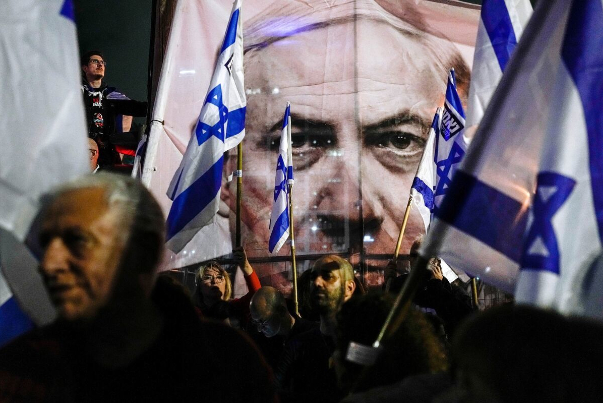Mansour Barati, speaking in an interview with the website of the Strategic Council on Foreign Relations, continued: After about a month of negotiations between the representatives of Netanyahu’s government and the main opposition parties at the residence of the head of the Zionist regime to reach a consensus solution, last week the office of Isaac Herzog, President of the Zionist regime, announced the end of the first round of negotiations without achieving any tangible results.
According to the expert, with the start of negotiations between the ruling coalition and the opposition in recent weeks, the street protests were followed with less intensity. Still, with the clarification of tremendous differences between the two sides, the organizers of the demonstrations demanded the withdrawal of the opposition parties led by Yair Lapid and Benny Gantz from the negotiations. They considered the negotiations to be only Netanyahu’s plan to kill time until the approval of the budget law.
The researcher of the Zionist regime affairs emphasized: Of course, simultaneously with the negotiation process in the last month, the Netanyahu government tried to mobilize its supporters in the streets of different cities and show by a street campaign that the game of protests does not go entirely in favor of the opponents of the Supreme Court reforms.
Pointing out that from the beginning of the protests on January 7, 2023, until last month, the streets of the big cities of the Zionist regime were occupied by the opponents of the judicial reforms. The supporters of such reforms did not appear much, he said: But by using the government capacities in the past month, supporters of reforms have come to the streets of the Zionist regime to express their opinions.
He added: The largest march of supporters of the reform case was held in Quds on April 28 with 200,000 people. Although the number of participants in that march never reached as many as the opponents of the reforms, it seems that this event was able to restore the confidence of Netanyahu’s government partially.
Barati stressed that it seems Netanyahu’s government will continue its strategy of a street campaign to quell opposition protests, saying it could lead to violent clashes between the two sides.
At the same time, the researcher said: Given the hopeless prospects of the negotiations, the opponents of the reforms may also return to the streets with all their strength and paralyze the Netanyahu government.
Barati stated that the events of March 27, 2023, can be considered as a turning point of the protests and said: On that day, the protesters came to the streets at night in response to the dismissal of Yoav Galant, the Minister of Defense of the Zionist regime for opposing the reforms and until the morning they protested, and the following day, various unions prepared for nationwide strikes.
The researcher also explained the future scenarios of the protests and said: It seems that if the demonstrations return to the complex phase, the protests will have the capacity to paralyze the government and cause severe dissatisfaction among some of Netanyahu’s government ministers, including Itamar Ben-Gvir, the Minister of Public Security who, even now, has many differences with Netanyahu.
He added: Increasing differences between Netanyahu and Ben-Gvir and putting Ben-Gvir in a passive position may encourage him to leave the government and dissolve the ruling coalition.
Barati also referred to other scenarios of the protests and said: In recent weeks, some Israeli media had reported about Netanyahu’s disappointment with the realization of judicial reforms and that Netanyahu may forget the reforms due to the current critical situation, but in that case, he will have a big challenge to satisfy the religious parties and extreme right-wing parties, ahead.










0 Comments